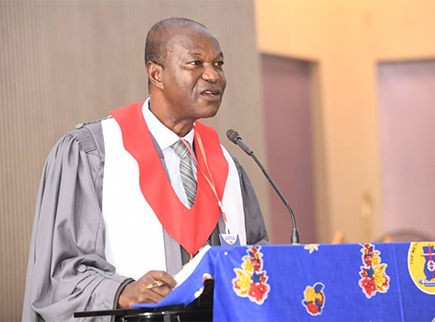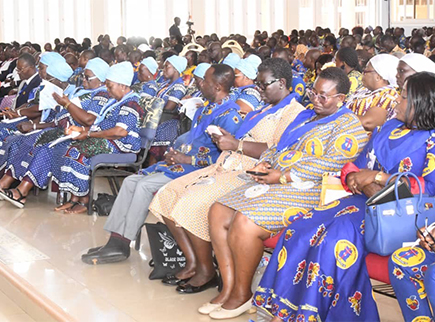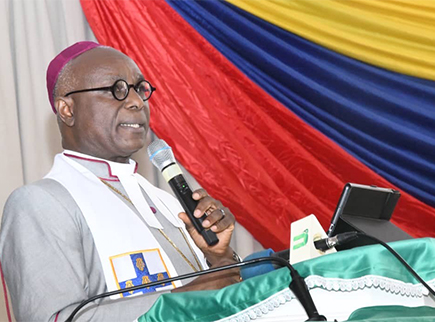The Methodist Church Ghana Lay Ministries Directorate Connexional Lay Movement Council has held its 64th/9th Biennial General Meeting (BGM).
The BGM comes at a moment of profound historical significance as the Methodist Church commemorates 75 years of the Lay Movement and also 190 years of Methodism in Ghana.
Speakers at the meeting indicated that the theme for the BGM, “Discipleship: Growing into Christian Maturity,” was both timely and transformational in a world defined by moral ambiguity, spiritual shallowness, and increasing hostility to truth, morality, and holiness.
Most Reverend Professor Johnson Kwabena Asamoah-Gyadu, the Presiding Bishop of the Methodist Church Ghana, noted that the Methodist Church was one of the oldest Christian denominations in the country, adding that over the years, the country had seen its contributions in education, healthcare, moral upbringing, and sometimes politics.

Most Rev. Prof. Asamoah-Gyedu stated that the church was doing this to ensure that children could be brought up in morally responsible ways.
He said in addition to formal education and bringing Christian teachings to the schools, the principal means of pastoral care and ministry is the Methodist church services.
He said that the pulpit existed for the preaching of the word of God, noting, however, that it was worrying that people had adopted all sorts of religious titles and were using the pulpit in deceptive ways, delivering prophecies, sometimes with political undertones, and causing confusion in homes, communities, personal lives, and the country.
The presiding bishop admonished the ministers of the Methodist Church to stick to the teachings and doctrines of the church, be serious in the ministry, and not to turn the pulpit into a box for telling jokes.
“I’m not suggesting that a person should not give illustrations, but do not turn the whole pulpit and preaching into a concert; we don’t want our ministers to emulate that,” he reiterated.
He also urged the ministers to be serious with the preaching of the scriptures and to make sure that they abide by what they preached, while urging church members to fear the Lord and take their positions in society seriously.
Reverend Asamoah-Gyadu also charged the Lay Movement to pay some attention to the physical and spiritual needs of the young people in the church, as they were the future of the country.
Mr Kwasi Attah-Antwi, the Lay President and the Chairman of the Connexional Lay Movement Council, indicated that the BGMs were not mere administrative rituals but solemn convocations where the Lay Movement of the church paused to assess its path and measure progress, confront challenges, and realign its collective visions with divine purposes.
Mr Attah-Antwi said that, in these hallowed moments, they reflected on what they had achieved and cast a clear vision forward, bold and faith-filled, for the revival, transformation, and growth of the Church.
He added that these milestones were no small feats, as they represented decades of faith, sacrifice, leadership, and legacy built not only by their revered clergy but also significantly shaped by the unsung efforts of countless numbers of laity who had served the church with fervent devotion and quiet dignity.

He reiterated that the Lay Movement had a sacred responsibility to lead in this charge, and they must therefore be the model of mature discipleship shaped by grace, guided by scripture, and empowered by the Holy Spirit.
“Let us rise beyond Sunday Christianity to active, spirit-led, spirit-filled, and fruit-bearing discipleship because the church needs disciples, not just attendees,” he added.
Mr Attah-Antwi again noted that in the face of rising youth unemployment and economic hardships, the Methodist Entrepreneurship Development Program (MEDP) with its related Methodist Entrepreneurship Fund (MEF) remained one of its most compelling avenues for economic transformation for the youth and vulnerable in society.
The MEDP launched at the 2024 Conference in Kumasi is aimed at empowering the youth, supporting church members’ businesses, and creating sustainable livelihoods.
The Lay Movement Council provided initial seed capital to establish the fund for the Church to scale up for its sustainability and growth.
He stated that the church must be intentional about creating wealth and jobs through faith-inspired entrepreneurship, noting that the church was considering a reliable mechanism to sustain the funding support for entrepreneurship development in the church, calling on members to make it a household tool for transformation in every diocese.

